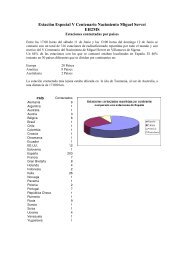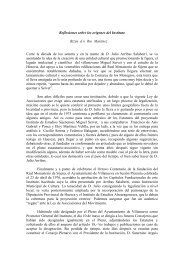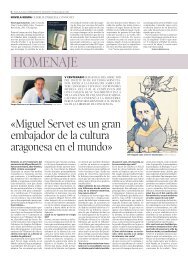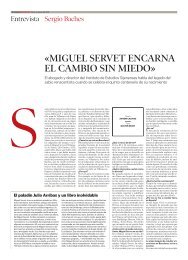New Page
New Page
New Page
Create successful ePaper yourself
Turn your PDF publications into a flip-book with our unique Google optimized e-Paper software.
it? Elaborate your statement in some detail and speak briefly or moderately on what you reject.<br />
Fourth: When God is mentioned in the Scriptures without any further definition, is it the essence<br />
and the three persons together that is meant or rather the Father or the Son separately?<br />
Fifth: Is Christ, inasmuch as he is God, god by nature or by communication? Is he, in fact, God by<br />
God or God by himself?<br />
Sixth: They require a declaration about how Christ is God according to the Scripture.<br />
Seventh: Should the Word, which in the beginning was with God, be regarded according to the<br />
Scripture as the existing Son God and as one who has been born since eternity or as one who existed<br />
merely in God's predestination? And if he is to be said to have been existing in reality at that time, does<br />
that not mean that two sons are made? Furthermore it is asked where this is taught manifestly in the Scriptures<br />
and they want unambiguous passages in the Scriptures, undistorted by human ingenuity.<br />
You should send these to me or to the brethren as soon as possible when you have consulted with<br />
your brethren, because I have adjourned the general synod summoned for this purpose. Please, do not let<br />
the brethren down. This is the time for them to come to an agreement and unite. Please, act diligently, and<br />
send all your writings with a few copies of The Tower of Babel, and write to Francis David as well. I<br />
would gladly let you have the Servet, but Mr. Prosper, who has all my books, is not here."11<br />
Unfortunately, the information Blandrata gives us is not sufficient to find out who the learned<br />
pastor is whose book he was sending and who, apparently, was wavering, not knowing how far he could<br />
go in his Antitrinitarianism. It should be emphasized, however, that the Italian heretic is asking Grzegorz<br />
Pawel to answer the questions to him or to the brethren (ad fratres), and thus it would seem justified to<br />
assume that the theological issues itemized above interested the whole leadership of the Antitrinitarianism<br />
organizing underground at that time, and Blandrata was not merely sharing his personal problems with<br />
the Polish brothers. (Nor does the text leave any doubt whatsoever that he is urging the Poles mainly at<br />
the stimulation of Ferenc Dávid.) These points thus can be interpreted as the fundamental questions of<br />
Antitrinitarianism, which was about to step out into the open. The first six contain no surprises, reflecting<br />
the same Tritheist-Servetian ideology that other documents of the first phase of Antitrinitarianism<br />
contain. The request to send the definitely Tritheist work of the Polish Antitrinitarian entitled Turris<br />
Babel along with his other writings is completely in accord with that. This in any case would clearly<br />
indicate that the Transylvanians were already making good use of the experience of the Poles while still<br />
looking for arguments.<br />
The seventh point, on the other hand, makes it quite clear that the ideas of Dávid and his associates<br />
cannot be described with Tritheism only and that it was at least problematic for them whether the<br />
Word was the son of God born from eternity and whether accepting this did not mean the making up of<br />
two sons. Thus it cannot be doubted that -- although the part of the document which can be regarded as<br />
Blandrata's more personal message discusses more explicitly the question of Christ's preexistence -- it<br />
was not only his problem but the wave of the development of Antitrinitarianism characteristic of the<br />
1560s touched other figures of the movement as well. It was the opening up of this wider perspective that<br />
enabled the very first document of the openly appearing Antitrinitarianism not to stop at Tritheism. It was<br />
thus only a matter of time and they would come forward into the open with the denial of Christ's preexistence.<br />
It happened quite soon, too, since as early as by the autumn of 1566 it had become clear that the<br />
compromise concluded around the middle of that year under pressure from ruling Prince John Sigismund<br />
was impossible to sustain. There has been a debate in the literature on the subject on whether it was Péter<br />
Melius Juhász, bishop of the Calvinists in Transtibiscum or Ferenc Dávid, bishop of the Hungarian<br />
10







